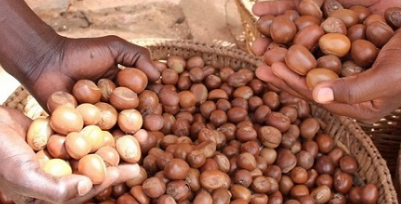The Ghana Shea Employers Association (GSEA) is renewing calls for an immediate ban on the export of raw shea nuts, citing the growing threat to local processors, value chain actors and the broader economy, particularly in Northern Region.
GSEA addressed media in Tamale recently and appealed for government and policymakers to implement urgent interventions to halt the export of raw shea nuts, which they maintain are essential in sustaining local production and creating jobs.
”Foreign investors can still participate in the sector, but they must be encouraged to establish processing factories in Ghana to promote employment and boost domestic revenue,” says Faiza Duut Majeed, Communications Officer-GSEA.
Indeed, the Association decries an increasing presence of foreign buyers in rural communities who are purchasing raw shea nuts in bulk for export, leaving local processors without access to raw materials.
This practice is undermining the local shea industry and pushing small-scale processors out of business. The Association indicated that countries such as Togo, Benin, Burkina Faso and Nigeria have already instituted bans on raw shea nut exports to protect their domestic industries.
The surge in foreign demand has contributed to significant price increases at the community level. A bowl (2kg) of shea nuts which sold for GH¢12 in 2023 rose to GH¢14 in early 2024 and currently sells for GH¢60, driven largely by middlemen and unregulated market activity.
“This situation is negatively affecting pickers, processors and local businesses, many of which are women-led. The resulting market distortion is collapsing the local shea economy,” the Association laments.
“When raw nuts are exported, we lose up to 300 percent of the potential value that could be added locally. This translates to lost jobs, reduced industrial growth and forfeited tax revenue – resources Ghana desperately needs for national development,” said the Association.
Also, women account for over 90 percent of the shea nut collection workforce and remain trapped at the value chain’s lowest end. This perpetuates poverty and limits their opportunity for upward economic mobility.
Consequently, GSEA urges government to impose an immediate ban on raw shea nut exports to secure supply for local processors and invest in local processing infrastructure through grants, low-interest loans and public-private partnerships to boost competitiveness.










